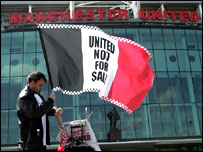SOLD TRAFFORD

Just back from a quick visit to Manchester for the launch of MAG's new advert and meetings about the planned Death Valley cycle ride (of which much more later).
The talk of the city was the takeover of Manchester United by American tycoon Malcolm Glazer.
Emotions are running high among United supporters, with effigies of Glazer being burnt outside Old Trafford, season tickets being torn up and the Manchester Evening News devoting front, back and centre pages to the story.
As an outsider, it's a fascinating affair to watch. It displays perfectly what happens when passion triumphs over logic.
"Man United is not for sale," insist the fans, who fear Glazer will do their beloved club what he did when he bought the Tampa Bay Buccaneers ten years ago -- blitz the stadium with advertising, raise ticket prices and....er....turn a laughing stock team into Superbowl winners.
But this, of course, is nonsense.
When Manchester United floated on the stock exchange as a PLC it became a commodity to be bought and sold like any other.
John Magnier and JP McManus are reckoned to have netted a profit of £80m by selling their 28.7% stake in the club.
Good for them. That's not betrayal -- it's good business, as this article explains.
And even if Malcolm Glazer doesn't care about football, has never been to a Man U game or stepped inside Old Trafford -- so what?
In my portfolio I've got (albeit miniscule) stakes in dozens of companies. I've never walked the shop floors of a single one of them -- nor do I want to.
In the business world, it's profit that matters, not passion.
So if the fans from Shareholders United want to "save their club," as their naive rhetoric insists, they won't succeed by burning effigies and tearing up season tickets.
They'll do it by kicking Malcolm Glazer where it hurts -- in the balance sheets -- by boycotting games and refusing to buy merchandise.

Just back from a quick visit to Manchester for the launch of MAG's new advert and meetings about the planned Death Valley cycle ride (of which much more later).
The talk of the city was the takeover of Manchester United by American tycoon Malcolm Glazer.
Emotions are running high among United supporters, with effigies of Glazer being burnt outside Old Trafford, season tickets being torn up and the Manchester Evening News devoting front, back and centre pages to the story.
As an outsider, it's a fascinating affair to watch. It displays perfectly what happens when passion triumphs over logic.
"Man United is not for sale," insist the fans, who fear Glazer will do their beloved club what he did when he bought the Tampa Bay Buccaneers ten years ago -- blitz the stadium with advertising, raise ticket prices and....er....turn a laughing stock team into Superbowl winners.
But this, of course, is nonsense.
When Manchester United floated on the stock exchange as a PLC it became a commodity to be bought and sold like any other.
John Magnier and JP McManus are reckoned to have netted a profit of £80m by selling their 28.7% stake in the club.
Good for them. That's not betrayal -- it's good business, as this article explains.
And even if Malcolm Glazer doesn't care about football, has never been to a Man U game or stepped inside Old Trafford -- so what?
In my portfolio I've got (albeit miniscule) stakes in dozens of companies. I've never walked the shop floors of a single one of them -- nor do I want to.
In the business world, it's profit that matters, not passion.
So if the fans from Shareholders United want to "save their club," as their naive rhetoric insists, they won't succeed by burning effigies and tearing up season tickets.
They'll do it by kicking Malcolm Glazer where it hurts -- in the balance sheets -- by boycotting games and refusing to buy merchandise.

0 Comments:
Post a Comment
<< Home